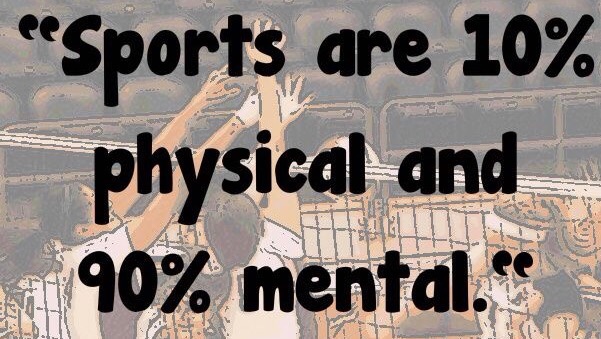l
Sports psychology, has gained more recognition in recent years by top athletes. It is a fact that many of today’s top athletes have a sports psychologist working with them to help keep them focused. So what if you are not a top athlete, do you need to have a mental focus that will help you perform at your peak? Think about this, you can still dominate on your playing field which could be the office, the gym, the classroom, and your home. Do you manage a large or small team of people? Do you have a huge workload on a daily basis? Do you have to pass AP classes? You see these may not be an organized sport but they are activities that you must perform at your peak for the best outcome. Let’s look and employ these strategies into your regimen for your daily dominance.
Do a Mental Dress Rehearsal
Ever notice how top athletes never seem to be overwhelmed by the big moment? Usually, it’s because they have been there before either in real life or in their mind. Another term for this is visualization. You actually see and feel yourself going through the motion before acting it out. “Studies show that the parts of the brain that are used when thinking about a task are the same ones used when actually doing it,” says sports psychologist Shane Murphy, Ph.D., editor of The Sport Psych Handbook. So visualizing a good performance can give you the same confidence that comes from having performed well in the past. Got a presentation coming up at work? Have to give a presentation in front of the panel as a final project for your graduation? Have to make sure your home looks great for your holiday celebration? In the days leading up to the event, try this exercise: Close your eyes and imagine hitting all of your talking points and getting the audience to reward you with a big round of applause at the end. When it’s time for the real deal, you’ll be more relaxed. In fact, you’ll feel as if you have done it before.
Word Up
Sports psychologists often tell their athletes to find a few words or phrases that can automatically bring their performance into focus. “Key words help you get connected with the way you want to feel,” says Wayne Halliwell, Ph.D., of the University of Montreal, who helped guide Canadian figure skater Joannie Rochette to a bronze medal at the Vancouver 2010 Winter Olympics just days after her mother’s sudden death. Stand tall was one of the phrases she kept in mind as she took the ice. This was a double reminder to watch her form and her mood. Ask yourself, what do I want to achieve? If you want to stay open-minded on a blind date, your key word might be open; if you are running a 5-K, it might be steady. If you are sprinting a race, your key word might be lightning. This also goes with your tongue being a powerful organ that helps you speak success and failure in your life and the lives of others. Guard your words and actions so that you get the best output for your success. If you must lead, your key word might be respect which is what you demand of your followers and what you also give them.
Let It Go
During training sessions, athletes are aware of every move they make. But under the pressure of competition, overanalyzing what they are doing can lead to indecision and tightening up. For example, we have groups of athletes that must perform specific skills and learn them while doing them. It is a hands on approach and if they tighten up, their technique suffers. They are so concerned with every move that they are paralyzed by analysis. So what is the result? Costly mistakes. One way to calm an overactive mind is by using diversionary tactics, says Sian Beilock, Ph.D., a psychologist at the University of Chicago and author of Choke: What the Secrets of the Brain Reveal About Getting It Right When You Have To. For example, before making a free throw, some basketball players will distract themselves by concentrating on the logo written on the ball. Sian Beilock instructs golfers to count backward by 3’s, starting at 25, a few seconds before striking the ball on a crucial shot. When you are swallowed up by a wave of performance anxiety, try using the same technique.
Ignore the Haters
Athletes are always trying to psych one another out, and sometimes your detractors can be just as intimidating and cutthroat. Letting negative thoughts sink in can rattle your nerves, so when rivals try to play mind games, Nicole Detling Miller, Ph.D., a professor at the University of Utah, tells her athletes to consider it a compliment. “If they’re targeting you, it’s probably out of jealousy,” she says.” Tell yourself, if they’re gunning for me, I must be doing something right!” Why so much negative attention on you? Because you are a threat. The haters are going to hate, let them hate. Turn that negative energy into a powerful momentum for you to thrive in. For example, what if you are the star quarterback, the defensive line will be coming after you to rattle you. They will talk trash to you. They want to get sacks on you, they want to hit you, and disrupt your timing. They want you to hear and feel footsteps all the time. Well the negative talk they give you only allows you to cause them to over pursue you, then you roll out, and pass the ball for the 1st down or even a touchdown. Their negativity towards you opens up play action plays that make you the star because they are keying off your moves. They do not realize it, but they have just given the power over to you. What if you are getting into the ring to battle it out with another fighter and he is spewing the worst words you have ever heard to rattle you? Take his words and make him eat them after you hand him his defeat. Show him that the mind game did not phase you because you kept your composure. Tell yourself that he can be beaten. Tell yourself that you trained harder and smarter than he did for this fight. Tell yourself victory is yours!
The mind is such a powerful part that you must control at all times. Too many people have fallen from greatness because they allowed the haters to win or they paralyzed themselves with too much analysis of every move they made. Your mind and body must be on the same channel in order for peak performance to occur so make sure you are taking care of both.
Reference:
Psychology of Sport – Peak Performance: Get Your Head in the Game
By Laura Bei

